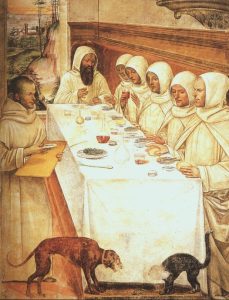Archive, Readings
Desert Fathers 22
You can find this episode in video format here – a dedicated page – and pick it up in audio wherever you listen to podcasts. On YouTube, the full range of episodes can be found here.
It was said about Abba Macarios that when he spent time with the brethren he established as a rule for himself that he would, if wine was offered, partake of it for the brethren’s sake. But for a single cup [of wine] he would spend one day without drinking water. So the brethren served him [wine] to afford him relaxation; and the elder received it with joy in order to mortify himself. His disciple, however, seeing how things played out, said to the brethren: ‘For God’s sake, stop giving it to him, for if you do not he will discipline himself to death back in his cell!’ Learning what was going on, the brethren no longer offered it to him.
Each year on Ash Wednesday, set to embark on what the liturgy calls our season of spiritual warfare, we hear the Lord’s admonition  from the Gospel of Matthew: ‘when you fast, do not look dismal, like the hypocrites’. We are not to appear glum, not to make a display of our asceticism. Instead we are told: ‘when you fast, anoint your head and wash your face, that your fasting may not be seen by men but by your Father who is in secret; and your Father who sees in secret will reward you.’ The desert monks took this injunction literally. They could go to great lengths in order to keep their austerity hidden. We are told of Fathers, even very distinguished ones, who are put right when they fail even minimally in this regard. Vanity is to God-seekers a more insidious enemy than infractions of regulated fasting.
from the Gospel of Matthew: ‘when you fast, do not look dismal, like the hypocrites’. We are not to appear glum, not to make a display of our asceticism. Instead we are told: ‘when you fast, anoint your head and wash your face, that your fasting may not be seen by men but by your Father who is in secret; and your Father who sees in secret will reward you.’ The desert monks took this injunction literally. They could go to great lengths in order to keep their austerity hidden. We are told of Fathers, even very distinguished ones, who are put right when they fail even minimally in this regard. Vanity is to God-seekers a more insidious enemy than infractions of regulated fasting.
The Fathers stressed the importance to courtesy, too. If you go to visit somebody and find that your hosts, to honour you, have put on a spread that does not correspond to rules you have fixed for yourself, you risk causing offence by saying: ‘I’m sorry, but I cannot eat sausage rolls on a Wednesday in Lent!’ Not only will you fail to honour their hospitality; you belittle them by making them see they had forgotten some ascetic precept or other. You yourself may be left aglow with self-satisfaction. One walks a knife’s edge in such cases. Principles are important; but more beneficial still is readiness to transcend one’s individual fixed ideas.
Macarios knows it gives his brothers joy to offer him a glass on occasion. It is their way of giving him something back for all he gives them. Accepting their gesture, he shows he is part of their fellowship. He does not stay aloof. At the same time he knows that wine, even in modest amounts, does not further prayer. Notwithstanding his hosts’ good intention, social drinking compromises his purpose.
That is why he resolves to pay each glass back secretly, so to speak, by an act of self-renunciation. It is a radical one. We are often reminded how hot the desert is; the mere fact of living in it is a trial. Even seasoned monastics can be mesmerised by the thought of water-filled vegetables. One Father hung a cucumber from the ceiling in his cell to keep this preeminent object of desire before his eyes, to fight temptation. Israel’s children’s pining, during the exodus, for Egypt’s ‘cucumbers, melons, leeks, onions, and garlic’ echo in the sayings of the Desert Fathers. To deprive oneself entirely of water for a whole day in such a place was an heroic, even dangerous feat, causing Macarios’s disciple to intervene to stop what he saw as plain madness.
The brethren had had no idea of Macarios’s agreement with himself. We imagine their distress: they thought they were being kind to an old friend, but in fact had caused him hardship. This points us to the first lesson we can draw from this story: when we offer hospitality, a gesture of kindness, or a gift, do we do it for others’ sake or for our own pleasure? Have we asked if they would like what we offer, or have we simply served it up on a plate, perhaps in a double portion? What Macarios teaches on the other hand is no less important. Great self-control is needed to accept with tact an offering that repels me, and to do it so whole-heartedly that the giver is thrilled. Such situations are not to do with dissemblance. Macarios demonstrates an ability to discern higher goods. A true ascetic will rejoice more in occasions to mortify self-will than in displaying the rigour of his or her observance. 
The concern to show others honour, to avoid giving offence, is evidenced with countless variations in the literature. The story is told of Abba John on a journey. His guide lost his way. It was night. John’s companions said, ‘What to do? This fellow is getting us more and more lost!’ John said not a word. If he, so highly respected, did, he would humiliate his guide. So he pretended to be tired, unable to go on. The company rested until sunrise, when they could retrace their path. This is the spirit of the Fathers: rather to spend a night in uncertainty and cold than to belittle another.
Naturally, the pretext of charity can be instrumentalised as an underhand means to obtain what I want but should not have right now, rest or wine or whatever it is. There are no hard-and-fast rules. Each case is judged on merit. When a brother asked Abba Sisoes what to do when others would detain him, after church, for an agape, Sisoes said: ‘It is a difficult question’.
What matters is to ask it, then to seek a rational answer illumined by charity, not a dressed-up excuse for intemperance.
